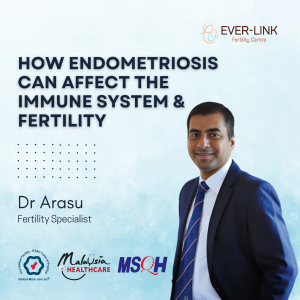
Endometriosis is a condition that affects millions of women worldwide, yet many people still don’t fully understand it. It happens when tissue similar to the lining inside the uterus starts to grow outside of it, often on the ovaries, fallopian tubes, or other parts of the pelvic area. While this might not sound like a big deal, it can lead to pain, inflammation, and problems getting pregnant. But did you know that endometriosis also affects the immune system? And that might be one of the reasons it impacts fertility.
The Immune System’s Role
The immune system is your body’s defense team. It fights off infections and helps clean up damaged cells. But in women with endometriosis, this system doesn’t work quite right.
Here’s how:
- It doesn’t clear out misplaced cells properly. Normally, the immune system would remove endometrial-like cells that grow in the wrong places. But in people with endometriosis, it often fails to do so.
- It causes more inflammation. The immune system reacts to these cells as if they were a threat. This can lead to ongoing inflammation, which damages nearby tissue and causes pain.
- It produces harmful substances. Some immune cells release chemicals called cytokines. In endometriosis, these chemicals are found in higher amounts and may make it harder for an embryo to implant in the uterus.
Endometriosis and Fertility
Many women with endometriosis can still get pregnant. However, the condition is known to make it more difficult. Here’s why:
- Scar tissue can block the way. When inflammation continues over time, it can lead to scar tissue and adhesions that twist or block the fallopian tubes. This makes it harder for the egg and sperm to meet.
- Egg quality may suffer. Some studies suggest that endometriosis may lower the quality of eggs, which can make pregnancy more difficult.
- The uterus might be less welcoming. Because of the inflammation and immune system issues, the lining of the uterus might not be ideal for an embryo to attach and grow.
What Can Be Done?
The good news is that there are ways to manage endometriosis and improve fertility. Doctors may suggest:
- Pain medication to control symptoms
- Hormone therapy to slow the growth of endometrial tissue
- Surgery to remove the abnormal tissue, especially if it’s blocking the fallopian tubes or damaging the ovaries
- Fertility treatments like in vitro fertilization (IVF), especially for those trying to get pregnant
It’s important to talk to a doctor who understands endometriosis well. Everyone’s body is different, so treatments should be based on individual needs.
Final Thoughts
Endometriosis is more than just painful periods. It’s a complex condition that can throw off the immune system and affect fertility. But with the right care, many women go on to live full, healthy lives and even start families of their own. If you or someone you know is dealing with this condition, don’t hesitate to reach out for support. Understanding how the body works is the first step toward taking control.

